Unit 1 Can you play the guitar? Section A Grammar Focus-3c 课件(共33张PPT)
文档属性
| 名称 | Unit 1 Can you play the guitar? Section A Grammar Focus-3c 课件(共33张PPT) | 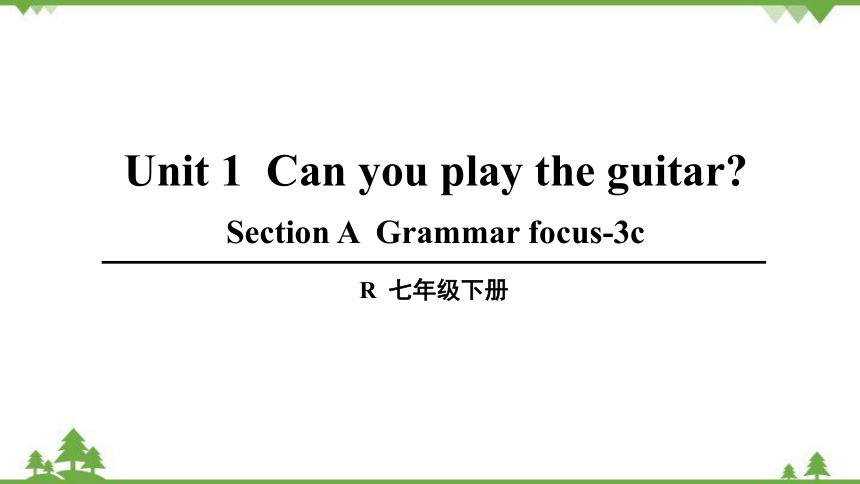 | |
| 格式 | ppt | ||
| 文件大小 | 2.4MB | ||
| 资源类型 | 教案 | ||
| 版本资源 | 人教新目标(Go for it)版 | ||
| 科目 | 英语 | ||
| 更新时间 | 2022-05-25 20:08:09 | ||
图片预览

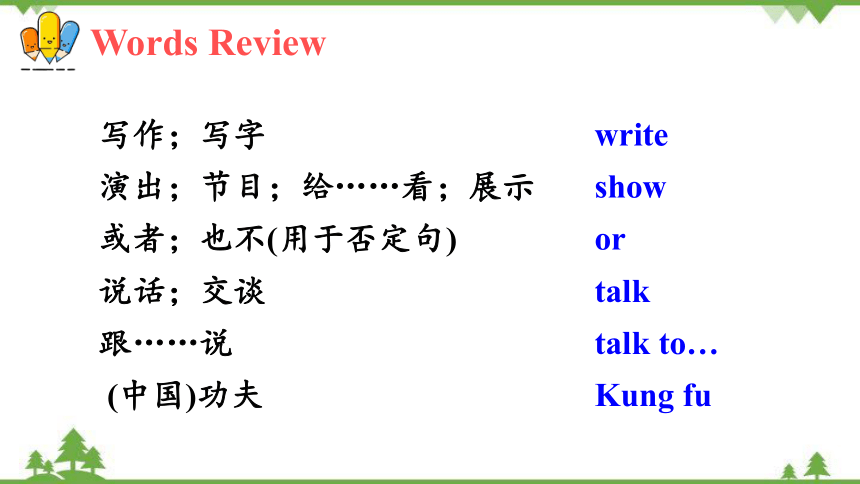


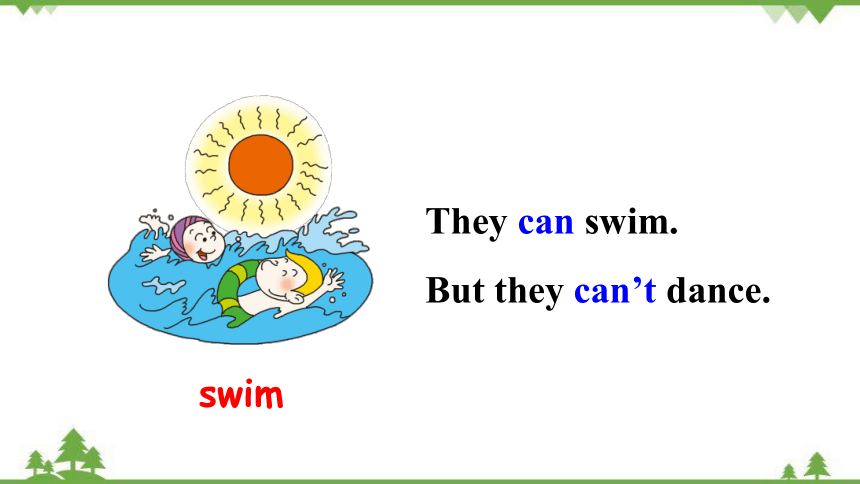
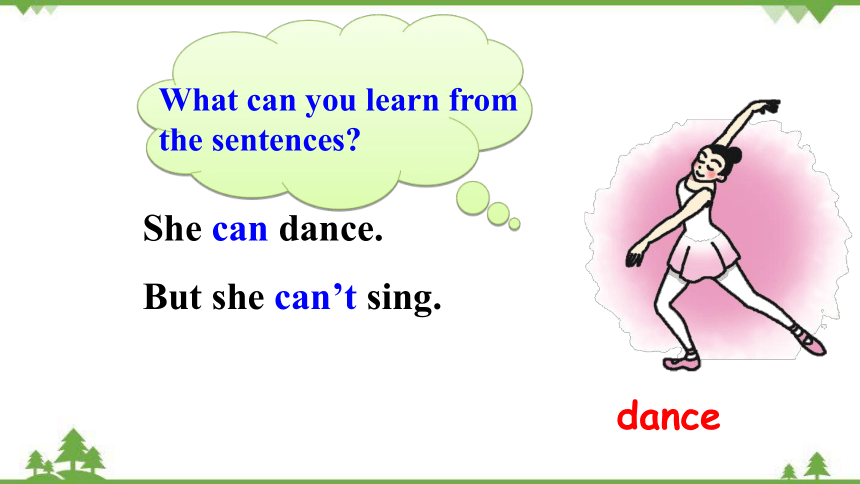
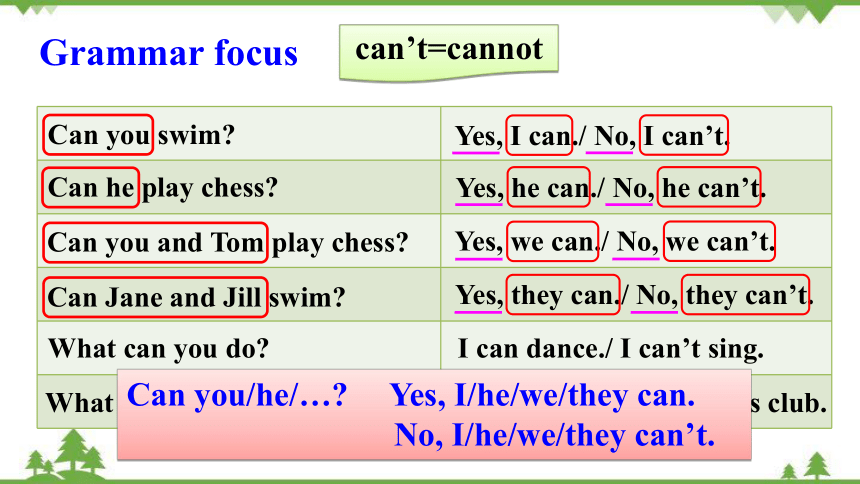
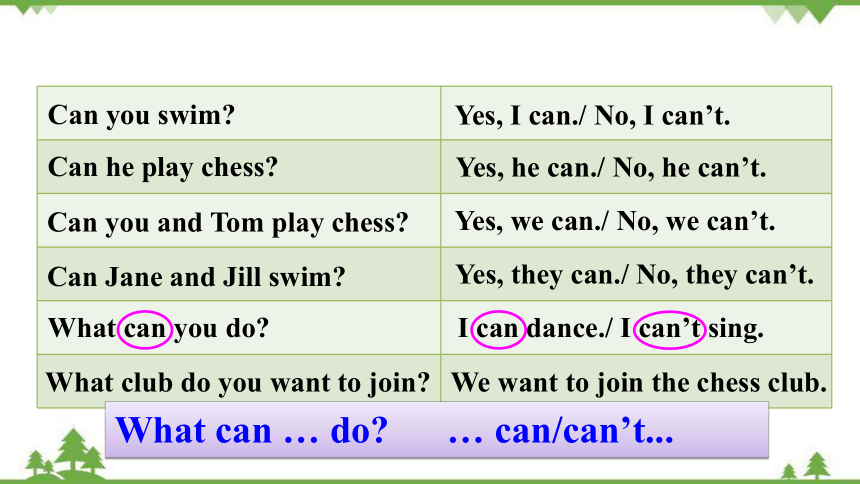


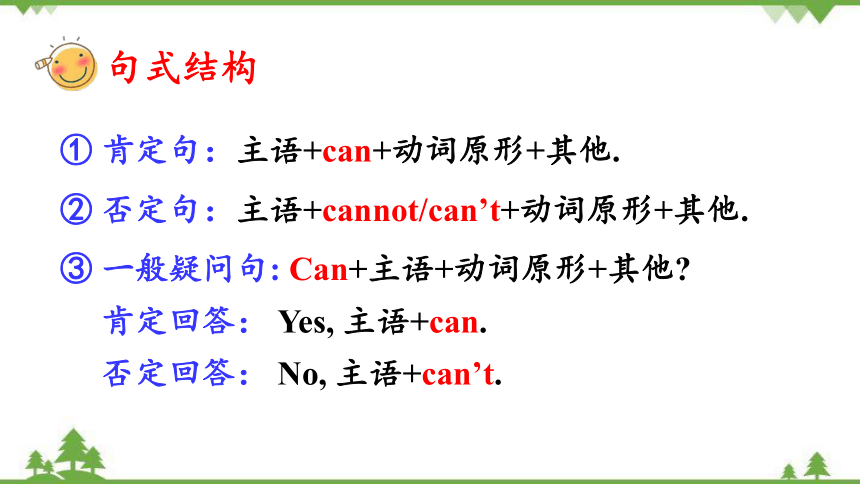
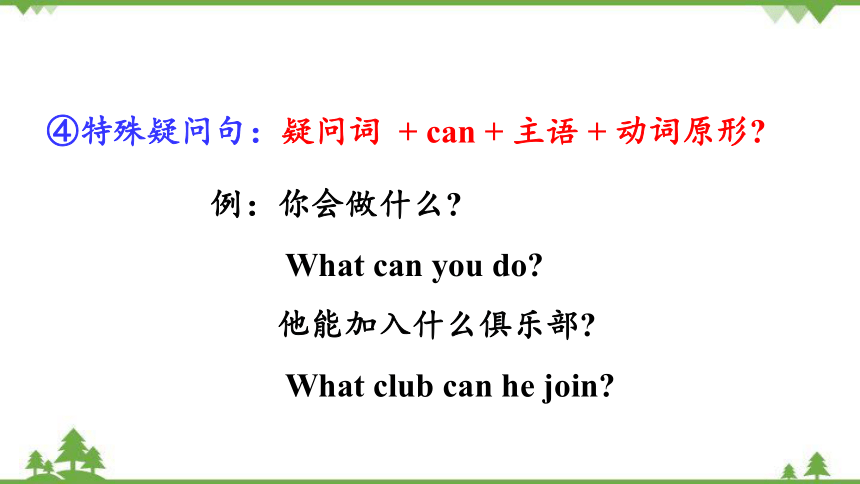
文档简介
(共33张PPT)
R 七年级下册
Unit 1 Can you play the guitar
Section A Grammar focus-3c
Words Review
写作;写字
演出;节目;给……看;展示
或者;也不(用于否定句)
说话;交谈
跟……说
(中国)功夫
write show
or
talk
talk to…
Kung fu
write
show
or
talk
talk to
Kung fu
Review
draw
She can draw.
But she can’t swim.
swim
They can swim.
But they can’t dance.
dance
She can dance.
But she can’t sing.
What can you learn from the sentences
Yes, I can./ No, I can’t.
Yes, he can./ No, he can’t.
Yes, we can./ No, we can’t.
Yes, they can./ No, they can’t.
What can you do
What club do you want to join
I can dance./ I can’t sing.
We want to join the chess club.
Can you swim
Can he play chess
Can you and Tom play chess
Can Jane and Jill swim
Grammar focus
can’t=cannot
Can you/he/… Yes, I/he/we/they can.
No, I/he/we/they can’t.
Yes, I can./ No, I can’t.
Yes, he can./ No, he can’t.
Yes, we can./ No, we can’t.
Yes, they can./ No, they can’t.
What can you do
What club do you want to join
I can dance./ I can’t sing.
We want to join the chess club.
Can you swim
Can he play chess
Can you and Tom play chess
Can Jane and Jill swim
What can … do … can/can’t...
情态动词 can
can 是情态动词,意为“能,会”,表示某人或某物具备的能力,还可用来提出请求,没有人称和数的变化,后面直接接动词原形。
can的用法
1. 表示“能力”,意为“能,会”。
例:我会讲英语。
I can speak English.
2.表示“请求”或“许可”。
例:你能帮我学汉语吗?
Can you help me with my Chinese
① 肯定句:主语+can+动词原形+其他.
② 否定句:主语+cannot/can’t+动词原形+其他.
③ 一般疑问句: Can+主语+动词原形+其他 肯定回答: Yes, 主语+can. 否定回答: No, 主语+can’t.
句式结构
④特殊疑问句:疑问词 + can + 主语 + 动词原形
例:你会做什么
What can you do
他能加入什么俱乐部
What club can he join
He can speak English.
陈述句
He can’t speak English.
否定句
Can he speak English
一般疑问句
Yes, he can.
No he can’t.
肯定回答
否定回答
特殊疑问句
What can he do
3a
Write questions and answers with the words and phrases.
1.Wu Jun / speak English / Chinese
___________________________________________
___________________________________________
2.Mike / play basketball / play tennis
___________________________________________
___________________________________________
Can Wu Jun speak English
No, he can’t, but he can speak Chinese.
Can Mike play basketball
No, he can’t, but he can play tennis.
3.Jane and Jill / dance/ sing
___________________________________________
___________________________________________
4.Grace / play soccer / play volleyball
___________________________________________
___________________________________________
5.Bill / write stories / tell stories
___________________________________________
___________________________________________
Can Jane and Jill dance
No, they can’t, but they can sing.
Can Grace play soccer
No, she can’t, but she can play volleyball.
Can Bill write stories
No, he can’t, but he can tell stories.
3b
Complete the poster with the words in the box.
Students Wanted for School Show
We want students for the school show. Can you _____ or ______ Can you _____ the guitar Can you ____ stories Please talk to Mr. Zhang
after school.
play sing tell dance
sing
dance
play
tell
Read and pay attention to the basic elements of a poster:
Students Wanted for School Show
We want students for the school show. Can you _____ or ______ Can you _____ the guitar Can you ____ stories Please talk to Mr. Zhang
after school.
sing
dance
play
tell
标题
正文(包括活动名称、应聘者所需才能、活动联系人)
与正文相配的图片
Look at the poster and answer the questions.
1. When is the school show
2. Where is it
Name What can you do
____________________________________________________________________________________________________
3c
What can your group do in the school show Make a list.
School Show
Sunday 6:00 p.m.
in the music room.
What can you do
Come and show us!
Divide the class into groups of 3-6 students.
A student in your group will be the investigator, he/she will ask every member in the group about their abilities.
Another student in the group will record the answers.
Then the third student in the group will make a report to the whole class.
Role-play
In our group, Alice can dance. Paul can’t dance but he can tell stories…
For example:
Language points
这是一个选择疑问句。
1.Can you sing or dance 你会唱歌或跳舞吗?
选择疑问句:提供两种或两种以上的情况,供对方选择的疑问句。
构成方式:一般疑问句+or+一般疑问句?
与前面一般疑问句相同的部分可省
选择疑问句需根据实际选择情况来回答,而不用Yes和No来回答。
若选择疑问句中有三个或三个以上并列部分,or用来连接最后一部分,前两个或两个以上的并列部分用逗号隔开。
例:你喜欢苹果、橙子还是香蕉?
Do you like apples, oranges or bananas
选择疑问句的前半部分也可以是特殊疑问句。
例:谁是你的英语老师,高小姐还是刘小姐?
Who is your English teacher, Miss Gao or Miss Liu
哪一个是最小的,太阳、月球还是地球
Which one is the smallest, the sun, the moon or the earth
2. Please talk to Mr. Zhang after school.
请放学后跟张老师说。
(1)本句是一个祈使句。
祈使句:用来表示请求、命令或叮嘱的句子。
祈使句一般省略主语,为使语气显得委婉、礼貌,说话人常在句首或句尾加please, 在句尾加please时,please前通常用逗号。
例:请给我看一下你的书。
Please show your book to me.
请喝杯茶。
Have a cup of tea, please.
祈使句的否定形式是直接在动词原形前加don’t。
例:不要在图书馆大声讲话。
Don’t talk loudly in the library.
(2) talk作不及物动词,意为“说话,交谈”。
表示与某人说话时,应在其后加介词with 或to;
表示谈论什么事物时,则应在其后加上介词about。
例:我喜欢和她谈话。
I like to talk to/with her.
迈克喜欢谈论体育。
Mike likes talking about sports.
辨析:talk,say,speak与tell
talk
say
意为“说话;谈话”,一般用作不及物动词,常与to/with + sb.等介词短语连用。
强调“说”的内容,常作及物动词,其后面接所要说的内容。
speak
tell
(1)作不及物动词时,不强调说话的内容;常与to + sb.连用。
(2)作及物动词时,其后的宾语一般是表示某种语言的名词。
意为“告诉”,作及物动词,其常用结构为:tell sb. sth. 或tell sb. to do sth.。
talk
say
speak
tell
talk
say
speak
talking
tell
speak
1. Let me ________ to him.
2. May I ________ to Mr. Zhang
3. What do you want to ________
4. What are you ________ about
5. Please ________ me your name.
6. He can ________ French.
Exercise
按照要求完成句子。
Li Juan can speak English. (改为一般疑问句)
_____ Li Juan _______ English
2. They can play volleyball well. (改为否定句)
They _____ _____ volleyball well.
Can speak
can’t play
3. Tom can do Chinese kung fu. (对划线部分提问)
______ can Tom ____
4. Jenny wants to join the music club. (对划线部分提问)
______ _____ does Jenny want to join
What do
What club
5. He is a teacher. He is a doctor. (把两句合并为一个选择疑问句)
_______ _______ a teacher _______ a doctor
6. Lucy can play computer games.(改为一般疑问句,并作肯定回答)
— _______ Lucy _______ computer games
— _______, she _______.
Is he or
Can play
Yes can
R 七年级下册
Unit 1 Can you play the guitar
Section A Grammar focus-3c
Words Review
写作;写字
演出;节目;给……看;展示
或者;也不(用于否定句)
说话;交谈
跟……说
(中国)功夫
write show
or
talk
talk to…
Kung fu
write
show
or
talk
talk to
Kung fu
Review
draw
She can draw.
But she can’t swim.
swim
They can swim.
But they can’t dance.
dance
She can dance.
But she can’t sing.
What can you learn from the sentences
Yes, I can./ No, I can’t.
Yes, he can./ No, he can’t.
Yes, we can./ No, we can’t.
Yes, they can./ No, they can’t.
What can you do
What club do you want to join
I can dance./ I can’t sing.
We want to join the chess club.
Can you swim
Can he play chess
Can you and Tom play chess
Can Jane and Jill swim
Grammar focus
can’t=cannot
Can you/he/… Yes, I/he/we/they can.
No, I/he/we/they can’t.
Yes, I can./ No, I can’t.
Yes, he can./ No, he can’t.
Yes, we can./ No, we can’t.
Yes, they can./ No, they can’t.
What can you do
What club do you want to join
I can dance./ I can’t sing.
We want to join the chess club.
Can you swim
Can he play chess
Can you and Tom play chess
Can Jane and Jill swim
What can … do … can/can’t...
情态动词 can
can 是情态动词,意为“能,会”,表示某人或某物具备的能力,还可用来提出请求,没有人称和数的变化,后面直接接动词原形。
can的用法
1. 表示“能力”,意为“能,会”。
例:我会讲英语。
I can speak English.
2.表示“请求”或“许可”。
例:你能帮我学汉语吗?
Can you help me with my Chinese
① 肯定句:主语+can+动词原形+其他.
② 否定句:主语+cannot/can’t+动词原形+其他.
③ 一般疑问句: Can+主语+动词原形+其他 肯定回答: Yes, 主语+can. 否定回答: No, 主语+can’t.
句式结构
④特殊疑问句:疑问词 + can + 主语 + 动词原形
例:你会做什么
What can you do
他能加入什么俱乐部
What club can he join
He can speak English.
陈述句
He can’t speak English.
否定句
Can he speak English
一般疑问句
Yes, he can.
No he can’t.
肯定回答
否定回答
特殊疑问句
What can he do
3a
Write questions and answers with the words and phrases.
1.Wu Jun / speak English / Chinese
___________________________________________
___________________________________________
2.Mike / play basketball / play tennis
___________________________________________
___________________________________________
Can Wu Jun speak English
No, he can’t, but he can speak Chinese.
Can Mike play basketball
No, he can’t, but he can play tennis.
3.Jane and Jill / dance/ sing
___________________________________________
___________________________________________
4.Grace / play soccer / play volleyball
___________________________________________
___________________________________________
5.Bill / write stories / tell stories
___________________________________________
___________________________________________
Can Jane and Jill dance
No, they can’t, but they can sing.
Can Grace play soccer
No, she can’t, but she can play volleyball.
Can Bill write stories
No, he can’t, but he can tell stories.
3b
Complete the poster with the words in the box.
Students Wanted for School Show
We want students for the school show. Can you _____ or ______ Can you _____ the guitar Can you ____ stories Please talk to Mr. Zhang
after school.
play sing tell dance
sing
dance
play
tell
Read and pay attention to the basic elements of a poster:
Students Wanted for School Show
We want students for the school show. Can you _____ or ______ Can you _____ the guitar Can you ____ stories Please talk to Mr. Zhang
after school.
sing
dance
play
tell
标题
正文(包括活动名称、应聘者所需才能、活动联系人)
与正文相配的图片
Look at the poster and answer the questions.
1. When is the school show
2. Where is it
Name What can you do
____________________________________________________________________________________________________
3c
What can your group do in the school show Make a list.
School Show
Sunday 6:00 p.m.
in the music room.
What can you do
Come and show us!
Divide the class into groups of 3-6 students.
A student in your group will be the investigator, he/she will ask every member in the group about their abilities.
Another student in the group will record the answers.
Then the third student in the group will make a report to the whole class.
Role-play
In our group, Alice can dance. Paul can’t dance but he can tell stories…
For example:
Language points
这是一个选择疑问句。
1.Can you sing or dance 你会唱歌或跳舞吗?
选择疑问句:提供两种或两种以上的情况,供对方选择的疑问句。
构成方式:一般疑问句+or+一般疑问句?
与前面一般疑问句相同的部分可省
选择疑问句需根据实际选择情况来回答,而不用Yes和No来回答。
若选择疑问句中有三个或三个以上并列部分,or用来连接最后一部分,前两个或两个以上的并列部分用逗号隔开。
例:你喜欢苹果、橙子还是香蕉?
Do you like apples, oranges or bananas
选择疑问句的前半部分也可以是特殊疑问句。
例:谁是你的英语老师,高小姐还是刘小姐?
Who is your English teacher, Miss Gao or Miss Liu
哪一个是最小的,太阳、月球还是地球
Which one is the smallest, the sun, the moon or the earth
2. Please talk to Mr. Zhang after school.
请放学后跟张老师说。
(1)本句是一个祈使句。
祈使句:用来表示请求、命令或叮嘱的句子。
祈使句一般省略主语,为使语气显得委婉、礼貌,说话人常在句首或句尾加please, 在句尾加please时,please前通常用逗号。
例:请给我看一下你的书。
Please show your book to me.
请喝杯茶。
Have a cup of tea, please.
祈使句的否定形式是直接在动词原形前加don’t。
例:不要在图书馆大声讲话。
Don’t talk loudly in the library.
(2) talk作不及物动词,意为“说话,交谈”。
表示与某人说话时,应在其后加介词with 或to;
表示谈论什么事物时,则应在其后加上介词about。
例:我喜欢和她谈话。
I like to talk to/with her.
迈克喜欢谈论体育。
Mike likes talking about sports.
辨析:talk,say,speak与tell
talk
say
意为“说话;谈话”,一般用作不及物动词,常与to/with + sb.等介词短语连用。
强调“说”的内容,常作及物动词,其后面接所要说的内容。
speak
tell
(1)作不及物动词时,不强调说话的内容;常与to + sb.连用。
(2)作及物动词时,其后的宾语一般是表示某种语言的名词。
意为“告诉”,作及物动词,其常用结构为:tell sb. sth. 或tell sb. to do sth.。
talk
say
speak
tell
talk
say
speak
talking
tell
speak
1. Let me ________ to him.
2. May I ________ to Mr. Zhang
3. What do you want to ________
4. What are you ________ about
5. Please ________ me your name.
6. He can ________ French.
Exercise
按照要求完成句子。
Li Juan can speak English. (改为一般疑问句)
_____ Li Juan _______ English
2. They can play volleyball well. (改为否定句)
They _____ _____ volleyball well.
Can speak
can’t play
3. Tom can do Chinese kung fu. (对划线部分提问)
______ can Tom ____
4. Jenny wants to join the music club. (对划线部分提问)
______ _____ does Jenny want to join
What do
What club
5. He is a teacher. He is a doctor. (把两句合并为一个选择疑问句)
_______ _______ a teacher _______ a doctor
6. Lucy can play computer games.(改为一般疑问句,并作肯定回答)
— _______ Lucy _______ computer games
— _______, she _______.
Is he or
Can play
Yes can
同课章节目录
- Unit 1 Can you play the guitar?
- Section A
- Section B
- Unit 2 What time do you go to school?
- Section A
- Section B
- Unit 3 How do you get to school?
- Section A
- Section B
- Unit 4 Don't eat in class.
- Section A
- Section B
- Unit 5 Why do you like pandas?
- Section A
- Section B
- Unit 6 I'm watching TV.
- Section A
- Section B
- Review of Units 1-6
- Unit 7 It's raining!
- Section A
- Section B
- Unit 8 Is there a post office near here?
- Section A
- Section B
- Unit 9 What does he look like?
- Section A
- Section B
- Unit 10 I'd like some noodles.
- Section A
- Section B
- Unit 11 How was your school trip?
- Section A
- Section B
- Unit 12 What did you do last weekend?
- Section A
- Section B
